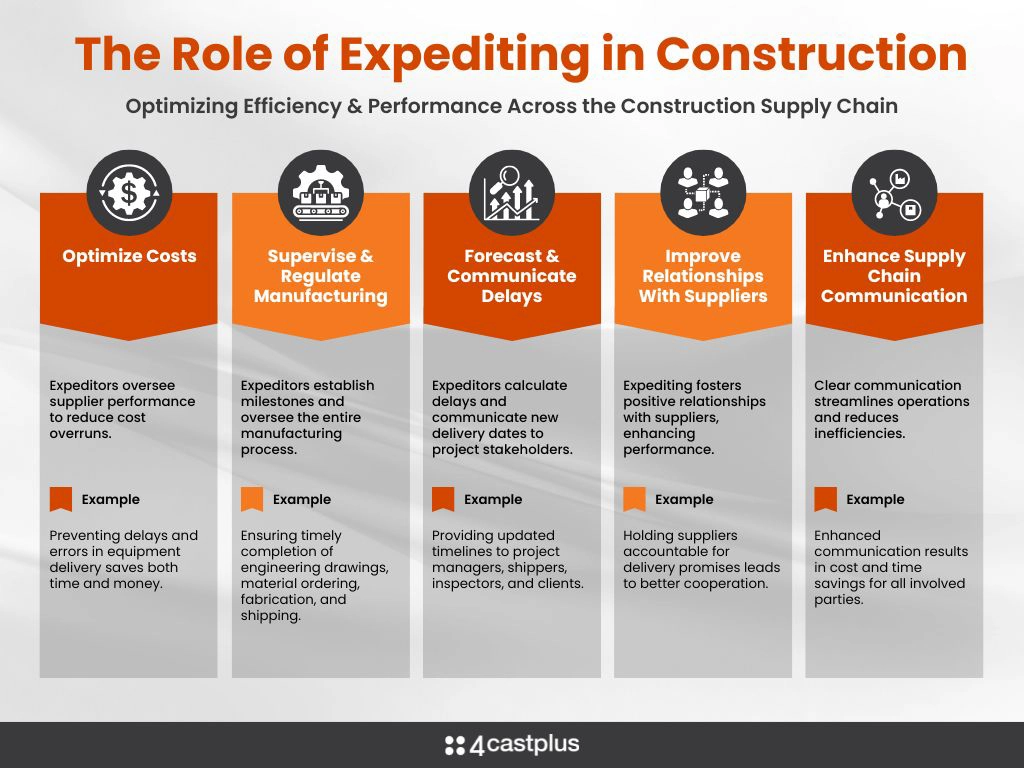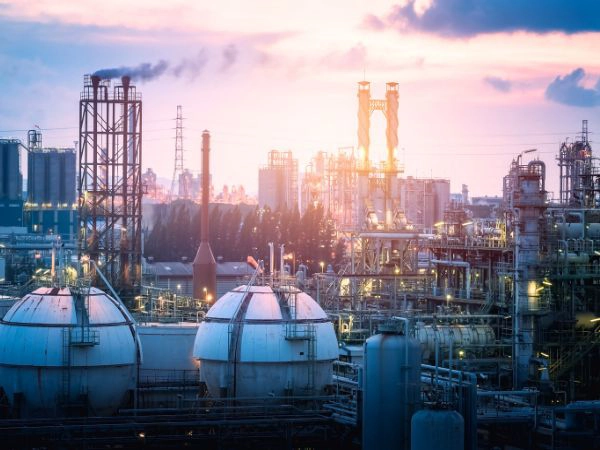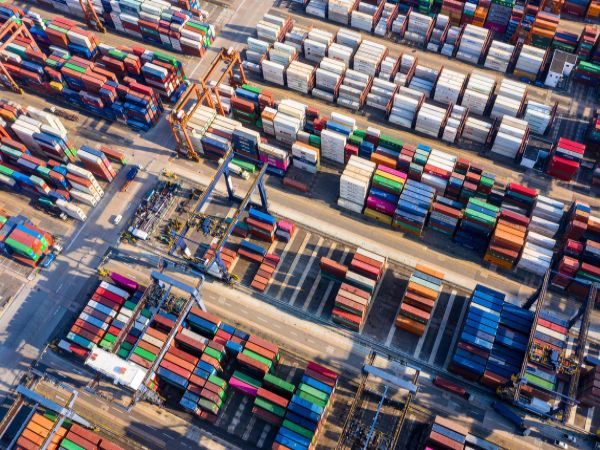Read In 8 Minutes
When it comes to procurement and supply chain, what typically comes to mind for most people is simply issuing purchase orders and paying vendor invoices. There can be several steps in-between those two activities, however, that play a significant role in more complex procurement: one of which is Expediting. Most engineering companies that perform EPC or EPCM work will be aware of the complexities of long-lead procurement. This type of procurement involves many steps, milestones, documents, tags, deliverables, etc. to ensure what is being procured is delivered to the site on time and to the agreed quality.
The purpose of this type of procurement is often for major items of equipment, or complex materials, that are custom fabricated for a specific purpose. Often found in industrial construction, these custom-built items are most often designed by engineers who draft detailed drawings and technical specifications for fabrication. They can take many months, and even years, to build; after which they need to be shipped to the site in good order.
The client, in these cases, is keenly aware of the risks and costs involved with delays in receiving these major pieces of equipment or materials. They therefore employ skilled procurement professionals – called expeditors – to monitor the whole process from start to delivery to ensure there are no delays. If there are going to be delays, it is known ahead of time so that schedulers, project managers, and construction managers can make the appropriate adjustments.

What is Expediting
Put simply, expediting is the process of ensuring the timely delivery of materials and equipment to construction sites. It involves proactive measures to monitor, manage and derisk the supply chain, mitigating any potential delays before they impact the project timeline. It encompasses a broad range of activities aimed at optimizing and derisking the supply chain, from order placement to final delivery.
These activities include verifying order accuracy, ensuring supplier compliance with specifications, and addressing any manufacturing or logistical challenges that could delay delivery. It also involves ensuring that the items are delivered to the job site arrive with the expected quality, and the shipments are complete. Expediting is critical for cost controls because delays, errors, changes and so forth all result in cost overruns that are entirely avoidable.
Learn More About Expediting In Construction
The Role of Expediting in Construction
Industrial construction projects have many such pieces of equipment that need to be expedited as these projects can require a variety of custom-built parts, components, modules, pumps, piping, etc. Expediting therefore plays a key role in project procurement. Here are five of the main benefits that expediting brings to project management and procurement:

- Optimize Cost
- Supervise and Regulate the Manufacturing Process
- Forecast and Communicate Potential Delays
- Improve Relationships with Suppliers
- Improve Communication Across the Supply Chain

We’ll go on to discuss these in further detail.
1. Optimize Cost
By overseeing and optimizing supplier performance, expeditors reduce the risk of cost overruns. Cost overruns can result from both quality and scheduling issues as projects are highly dependent on coordinating many moving parts that need to be synchronized within a slim margin of error.
Imagine, for example, a major piece of equipment is delivered to a job site, but is missing key parts, or is not designed according to the exact specifications. Upon inspection, the onsite engineer deems that it’s effectively useless to the crew of installers that have been dispatched to install it. The unit then has to be sent back to the fabricator and, best case they can fix it, and worst case, they need to start over. And then, who pays for all that? Expensive headaches like that are wholly preventable when an expediter is in place to supervise and spot these potential issues early on, before anything even gets shipped.
2. Supervise and Regulate the Manufacturing Process
Expeditors will setup a series of key milestones that represent critical events that need to be met by certain dates. These milestones can include events such as the completion of engineering drawings, the ordering of materials, fabrication start & end, shipping, etc. The expeditor will have regular check-in meetings with the supplier to get updates on the status of each milestone – and even make visits to the shop to oversee progress in person. Some long-lead items can be more complex in that they are dependent on multiple suppliers across different regions and multiple component parts. It can often be the case that one piece of equipment is manufactured and delivered in multiple pieces – requiring a more robust shipping and release schedule. Each part then has to be expedited on its own, then the whole unit is expedited as a sum of its parts.
In between each milestone, the expediters have to insert a lag time representing the estimated interval between each event. They’re the ones responsible for overseeing the entire supply chain from engineering to manufacturing to shipping to inspections, and so on.

3. Forecast and Communicate Potential Delays
With the complexity involved, clearly things can go sideways at any point in any milestone. It’s the expediters job in those cases, to calculate the size of the ensuing delay and forecast a new delivery date. This needs to be communicated to project managers of course, but also to shippers, inspectors and to the client as well.
Learn More About Forecasting In Construction
4. Improve Relationships with Suppliers
A key role of expediting is to forge positive relationships with all the suppliers along the supply chain. This has the effect of enhancing supplier performance as suppliers are more inclined to prioritize their efforts and deliveries when they know they’re being monitored and scrutinized and held responsible for their delivery promises. Building strong relationships with suppliers can lead to better cooperation and responsiveness, which is crucial for effective expediting.
Relationships with suppliers don’t always go well of course, and that’s another good thing to know. It’s unfortunate, but cutting ties with certain suppliers goes a long way towards shortlisting the trusted suppliers for the future.
5. Improve Communication Across the Supply Chain
Ultimately, expediting is about communication. When everyone knows what’s going on and what’s expected of them, they tend to operate in a much more streamlined fashion. Uncertainty breeds inefficiencies, so when you remove the chance of ambiguity and communicate clearly and often, everyone wins. That is undoubtedly true of most relationships, but when it comes to expediting, it results in savings in both cost and time.

Learn More
Maintain tight visibility and control of all your subcontractors and suppliers’ costs, activities, and productivity. Materials management, equipment rentals, miscellaneous purchases, and subcontracted services can all coexist together with full control over budget, accruals, project inventory, and much more. There is no other software system on the market that provides such comprehensive procurement management for construction projects.
 Platform
Platform Solutions
Solutions Owners
Owners Contractors
Contractors Engineering/EPCM
Engineering/EPCM Professional Services
Professional Services Resources
Resources White Papers
White Papers Case Studies
Case Studies Blog
Blog Videos
Videos Frequently Asked Questions
Frequently Asked Questions Company
Company About
About
